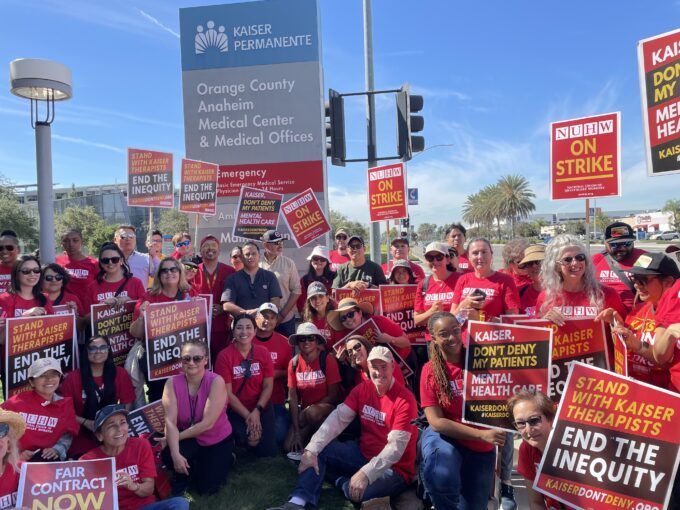The Strike at Kaiser Permanente: California Mental Healthcare Workers Demand Parity

The behavioral healthcare workers in Kaiser Permanente’s vast empire of hospitals, clinics medical offices, and homecare settings are on strike today in the third month of walking picket lines in Southern California from San Diego to Bakersfield. These workers, members of the National Union of Healthcare Workers (NUHW), include psychologists, social workers, psychiatric nurses, addiction medicine counselors, licensed clinical counselors, and marriage and family therapists. They provide behavioral health care for Kaiser’s 4.8 million members. Kaiser is the biggest Health Maintenance Organization in the country. The strike began on October 21, three weeks after the workers’ contract had expired.
The extraordinary thing about this strike is that it really is a strike for patients and for the public’s health, a strike for mental health care parity, a strike in a time of acute mental healthcare crisis in this country. Perhaps never before has depression and anxiety and increasingly suicide reached into the lives of so many people and their families. This strike is about equity in behavioral health care. The strikers have told me this time and again. They insist they would rather be with their patients, not on a picket line, but they can’t keep working in a system that treats mental health workers like automatons and denies them the time and resources to provide the care they know their patients need.
Of course, there are a myriad of issues in this strike including pensions (1700 providers work without pensions) and wages and working conditions. “We want enough time to do our jobs, which means seven hours per week to prepare for appointments, devise treatment plans, provide resources, file mandated reports, go to the bathroom, and so on. We want wage increases that are equitable with our colleagues,” writes Adriana Webb, a medical social worker at Kaiser in Panorama City in Los Angeles, in the online magazine Labor Notes.
The strikers also want their patients to have timely visits: today, they complain, members (Kaiser has fee paying members it provides services for) can book in for treatment, but frequently endure waits of four weeks or longer for return appointments even though California mandates a maximum wait time of 10 business days for both initial and return visits.
Webb again: “I see first-hand how Kaiser’s mental health system is failing patients. It’s nearly impossible for them to get access to timely mental health care, and because Kaiser treats its therapists like assembly line factory workers, so many therapists get burned out and leave.” This gap today between good care and assembly line care at Kaiser is so conspicuous that the state of California recently fined Kaiser $50 million.
In Northern California NUHW professionals won a brutal open-ended strike on these issues in 2022. Workers won provisions to recruit and retrain staff, reduce wait times for patients, as well as an agreement to collaborate in transforming Kaiser’s approach to mental health care. It was a big step forward, progress “but only due to our 14-year struggle,” says Sal Rosselli, who stepped aside as president of NUHW earlier this year. Now it’s Southern California’s turn.
A win will be a giant step forward, but NUHW healthcare workers will get at best a breather; Kaiser is relentless in its determination to break this union. This is not the first strike in Southern California, it won’t be the last. Kaiser does whatever it can to undermine the agreements and is quite willing to violate contracts and pay fines. It remains committed to visits delayed and treatment denied, their bottom line coming first. Still, things are moving in the right direction and bigger giants have fallen.
The words, “delayed” and “denied,” of course, have taken on new meaning for Americans in the last weeks; they have come to express the depth of frustration, the bipartisan anger of the public with the health care system, especially with the insurance giants. The mental health strikers understand this anger only too well; every day they are in the trenches and their demands starkly reflect the public’s anger. In 2022, they produced the pathbreaking study. “Care delayed is Care denied.” The study revealed in great detail “that when treatment is significantly postponed or delayed, it essentially equates to being denied that care altogether, as the delay can potentially worsen a patient’s condition or prevent timely intervention, leading to negative health consequences.”
“Care delayed is Care denied.” gives us a taste of just how broken our medical system is today and just how wedded it is to the pursuit of profit. But never mind, it works for our 1%, and their representatives who are now taking places in the new president’s cabinet. Kaiser’s profits were $4.1 billion in 2023; it has $64 billion in the bank. Kaiser’s CEO, Greg Adams’ “compensation” was $17,268,060 in 2023. The corporation also underwrites his ten pension plans. More than a dozen of his minions received a million or more annually. No wonder they fight so hard to keep this system. And Kaiser is only one among many healthcare behemoths reaping unimaginable financial rewards in today’s bonanza of the billionaires.
The strikers rotate pickets from hospital to hospital. They hold rallies that converge in front of Kaiser’s Pasadena Southern California’s headquarters. They have widespread labor support. 200 RNs representing the United Nurses Associations of California/UNAC joined picket lines on the first day. The UFCW, Unite/Here and CWA have given picket line and financial support. The San Diego Federtaion of Labor sent $10,000 to the NUHW hardship fund. Nearly 400 strikers participated in a major action outside Kaiser headquarters. The event began with a food and toy distribution at the International Brother of Electrical Workers (IBEW) hall before a throng of strikers, more than a block deep, marched to Kaiser headquarters with a giant cardboard heart in tow.
The Los Angeles Federation of Labor has gone all out, including sharing their flatbed truck and their huge parade balloons, the “Scabby Rat” and the “Fat Cat.” They organized a toy drive; it is the holiday season after all. They sentthe truck, loaded with toys to the rally in Pasadena. “The second I saw the toys, I started crying,” said Jade Rosado, a Kaiser therapist with three children. “Just to be able to choose something I knew my kids would enjoy. It brought me a lot of relief.” Rosado, who was named a Kaiser “Everyday Hero” in August for helping save a patient’s life, seeing the banners for her fellow “Everyday Hero” recipients hanging inside the corporate office, noted the hypocrisy; “It just made me think that all of us are heroes, so why don’t we get the same benefits, wage increases, and patient care time as other Kaiser workers,” Rosado said. “Kaiser is profiting off our labor, but they’re not incentivizing us to stay.”
Ligia Pacheco, a Kaiser therapist, also responding to the distribution, thanked supporters, saying, “After receiving the food and toy donations, our gratitude turned into powerful chanting that reflects the solidarity we continue to have.”
The LA Federation, in addition to toys, has donated boxes of groceries to the strikers. This led, on November 15, to a confrontation outside the Los Angeles Medical Center. As the federation workers were unloading the food boxes, two “bullying” HR executives, with the LAPD in tow, insisted they couldn’t distribute the food on its property (they were on the sidewalk) and demanded they shut down the event. Most of the boxes, which included perishable items, had to be rerouted to NUHW offices in Glendale.
“It was shocking to see that, frankly, Kaiser HR is so dirty that it would deny us food after four weeks without pay,” said Kassaundra Gutierrez-Thompson, who was present at the picket line. “It’s really alarming because at the end of the day, I still work for Kaiser, and it doesn’t feel like the HR Department has my back as a Kaiser employee.”
The California chapter of the National Association of Social Workers has written to Kaiser Permanente CEO Greg Adams calling on Kaiser to “resume good faith negotiations with NUHW’s Southern California members as soon as possible, and accept the union’s reasonable contract proposals.” Mental Health America of California is also supporting the strike, as is an array of mental health advocates.
In addition to all this, a majority of California legislators has signed onto nearly identical letters calling on Kaiser Permanente CEO Greg Adams to end the strike by returning to the bargaining table and agreeing to their proposals for settlement.
The letter from Assembly Speaker Robert Rivas is signed by 40 of his fellow Assembly members, and the letter from Senate President Pro Tempore Mike McGuire is signed by 20 of his fellow senators. The letters cite reports that Kaiser is cancelling therapy sessions at “an alarming rate” during the strike They urge Adams to “resume good faith negotiations with NUHW as soon as possible, and to agree to the union’s reasonable contract proposals in order to ensure the delivery of timely and appropriate behavioral health services to your patients.”
The solidarity, it’s been magnificent. Why, then, is Kaiser, which spends a small fortune present itself as a progressive vanguard in progressive healthcare, playing hardball with its psychologists, social workers, psychiatric nurses, counselors, family therapists?
Jim Clifford, an elected NUHW executive Board member, a bilingual therapist in Kaiser’s southern- most clinic (“I can see Tijuana from my office”) says it’s not that complicated. Money? “They’ve spent far more money trying to break us than settling with us would cost. They pay scab therapists $13, 000 a week and there’s still a high turnover.
“No, we’ve been a thorn in Kaiser’s side since we were first organized more than a decade ago. We’ve been the whistle blowers, the strongest advocates of providing decent mental health care and a voice for patients.
“Kaiser has fought us EVERY STEP of the way. It took us five years of fighting with them to get our first contract. That didn’t stop them, they tried to decertify us. They unilaterally took away our defined pension. They held us below the wages and benefits of the rest of the corporation. How are we supposed to get new therapists – and keep them?”
Sophia Mendoza, a veteran of southern California’s labor wars, was elected President of NUHW this last spring, replacing Rosselli, who, stepping aside, is still an active member of the union. She is confident that the union will win. “Our demands are reasonable. People want good mental health care and that’s what this is about. Our members, their patients, the electeds, and other unions are all coming together. Our fight to restore the defined benefit pension is a fight for all of labor. This is a fight to treat those who need and to provide mental health care equitably.”
The National Union of Healthcare Workers is a member-led movement that represents 19,000 healthcare workers in California and Hawaii, including more than 4,700 Kaiser mental health professionals.
This report is based on discussions with many NUHW members and staff as well as NUHW press releases.
